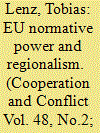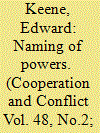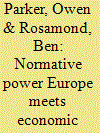|
|
|
Sort Order |
|
|
|
Items / Page
|
|
|
|
|
|
|
| Srl | Item |
| 1 |
ID:
120742


|
|
|
|
|
| Publication |
2013.
|
| Summary/Abstract |
This concluding article assesses the past decade of international scholarship on the European Union (EU) and normative power as represented by the contributions to the special issue. It argues that the normative power approach (NPA) makes it possible to explain, understand and judge the EU in global politics by rethinking the nature of power and actorness in a globalizing, multilateralizing and multipolarizing era. To do this, the article assesses the past decade in terms of normative power engagement, internationalization and comparison. The article then argues that rethinking power and actorness involves reassessing global theory and pouvoir normatif in action. The article concludes by setting out three ways of developing the NPA in its second decade: macro-approach, meso-characterization and micro-analysis. Following the suggestion of Emanuel Adler, Barry Buzan and Tim Dunne, the article sets out how studying the normative foundations of power through the NPA combines the normative rethinking of power and actorness with the structural changes of a globalizing, multilateralizing and multipolarizing era.
|
|
|
|
|
|
|
|
|
|
|
|
|
|
|
|
| 2 |
ID:
120741


|
|
|
|
|
| Publication |
2013.
|
| Summary/Abstract |
The aim in this contribution is to amplify the call, articulated across a range of disciplines relevant to international politics, for a paradigm shift that decentres the study and practice of Europe's international relations. Such a perspective is necessary both to make sense of our multipolar order and to reconstitute European agency in a non-European world. The analytical categories proposed in this article for a decentring agenda - provincialization, engagement and reconstruction(s) - can help to navigate the nexus of the empirical and the normative in such a decentring process. Applying the decentring logic to the EU's own foundational narrative, the authors suggest that, only by acknowledging the inflections of colonialism in the EU project itself, can the Union reinvent its normative power in the 21st century.
|
|
|
|
|
|
|
|
|
|
|
|
|
|
|
|
| 3 |
ID:
120737


|
|
|
|
|
| Publication |
2013.
|
| Summary/Abstract |
The ideational impact captured by Manners's notion of normative power Europe (NPE) appears most distinct and potentially most consequential in the realm of regionalism. However, empirical research on the topic has been hampered by the focus on EU actorness and methodological difficulties. Drawing on diffusion theory, this article develops conceptual, theoretical and methodological foundations for conceiving NPE as ideational diffusion. It argues that Europe's ideational influence on regionalism can be fruitfully understood as the largely indirect process by which the EU experience travels to other regions through socialization and emulation. Yet, as structural conditions vary across regions, EU ideational diffusion rarely leads to similar or even comparable institutional practices and outcomes. A choice-orientated approach is proposed for examining these claims empirically, which focuses on specifying the underlying counterfactual: political decisions in regionalism would have been different in the absence of the EU. The article concludes by outlining the analytical and normative promise of the proposed recasting of Manners's original concept.
|
|
|
|
|
|
|
|
|
|
|
|
|
|
|
|
| 4 |
ID:
120740


|
|
|
|
|
| Publication |
2013.
|
| Summary/Abstract |
This article offers an historical examination of the evolution of the practice of representing international actors as 'powers', and the classification of them as different kinds of 'power'. It argues that the practice emerged in parallel with the use of the language of sovereign states, and points to the importance of the body of journalistic literature on the 'present state of Europe', to the development of the usage of the term 'powers' and associated ideas about 'interests' and 'pretentions', which it contrasts with the tendency within the body of juristic literature to focus on the 'rights' of 'sovereigns'. It also charts the contrary move in the discourse of powers towards a grading of different classes, whereas the tendency within the discourse of sovereigns was more towards equality, although the article also notes parallel elements of hierarchy within equality. The article concludes by asking how the 'normative power Europe' thesis fits with, but in some cases also departs from, these representational practices. For example, the idea is often used to convey the unique, sui generis nature of the EU's identity as an international actor, whereas the normal tendency within the discourse of powers is towards more generic and class-oriented forms of identity.
|
|
|
|
|
|
|
|
|
|
|
|
|
|
|
|
| 5 |
ID:
120735


|
|
|
|
|
| Publication |
2013.
|
| Summary/Abstract |
Introduced by Ian Manners in an article published in 2002, the idea of 'normative power Europe' has been very widely debated by scholars in the fields of European studies and international relations. This article marks the first decade of scholarship on normative power Europe through a critical engagement with the concept, its influence and the wider normative turn within the literature on the European Union's role beyond its borders. The article reviews the strands of literature that have drawn on the concept of normative power and outlines the contours of the international debate on the concept. It provides an assessment of the impact of normative power and its application through the variety of ways it has been used via engagement, reaction and counter-reaction.
|
|
|
|
|
|
|
|
|
|
|
|
|
|
|
|
| 6 |
ID:
120736


|
|
|
|
|
| Publication |
2013.
|
| Summary/Abstract |
This article identifies four key problems in the debate about normative power Europe that may be fruitfully tackled when linking it to the concept of hegemony: the debate about whether EU foreign and external policy is driven by norms or interests; the problem of inconsistent behaviour as a result of competing and contested norms; the question of the role of state and non-state actors in EU foreign and external policy; and the problematic standing of normative power as an academic engagement, in particular in regard to whether the theory is of primarily explanatory, descriptive or normative value. The author suggests that the concept of hegemony may address these problems. First, it combines norms and interests, thus transcending the divide that has resulted in endless debates about the EU's standing as a normative power. Second, hegemony does not start from a pre-given set of norms with fixed meanings, but rather puts the struggles about these norms at centre stage, thus seeing inconsistencies not as undermining but as part and parcel of normative power. Third, hegemony expands our understanding of the actors involved in the construction and exercise of normative power, thus bringing not only Member States but also social forces in a much broader sense into the picture. Finally, hegemony reorientates the debate about normative power so as to reinstate the critical purpose that the concept was supposed to have from the start.
|
|
|
|
|
|
|
|
|
|
|
|
|
|
|
|
| 7 |
ID:
120738


|
|
|
|
|
| Publication |
2013.
|
| Summary/Abstract |
This article offers a reading of 'normative power Europe' (NPE) suggesting that the concept has been used for two distinct purposes: as a distinctive ontological characterisation of the EU, on the one hand, and as a critical approach to the study of the EU and its external projection, on the other. These positions are labelled 'NPE ontological reality' (NPE-OR) and 'NPE critical ontology' (NPE-CO), respectively, and this article sets out to show how they might work together in practice, even if they are incommensurable in theory. It is argued that NPE's ethico-political value resides in the extent that it embodies an ontologically plural reality, never entirely defined. By drawing attention to a blind-spot in the NPE position - the constitutive importance of economic liberalism ('market cosmopolitanism') to the EU's post-Westphalian character - attention is drawn to the normative basis of market cosmopolitanism and its connections to NPE-OR are described. It is argued that, from an NPE-CO perspective, we should exercise caution in celebrating NPE-OR as post-Westphalian reality to the extent that it is rooted in a market cosmopolitics.
|
|
|
|
|
|
|
|
|
|
|
|
|
|
|
|
| 8 |
ID:
120739


|
|
|
|
|
| Publication |
2013.
|
| Summary/Abstract |
Who or what is a normative power? In response to this query the article suggests that normative powers are those actors that are recognized as such by others. This qualifies Ian Manners's oft-quoted proposition that normative powers are only those actors that have the ability to 'shape what can be "normal" in international life'. The proposition is that the definitions of the 'normal' are not merely undertaken by normative power, but they emerge in the context of its interaction with others. Recognition, in this setting, is indicated by the specific reactions of target states. In this respect, the issue is not merely about being and becoming a normative power, but also about being recognized as one by others. The article details this proposition through a parallel assessment of normative power Europe and normative power China. The intention of such comparison is to elicit the key elements of normative power in global life.
|
|
|
|
|
|
|
|
|
|
|
|
|
|
|
|
|
|
|
|
|